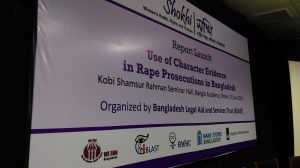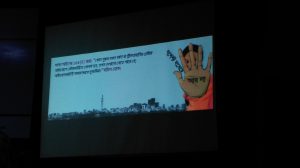Only the “Chaste” are Raped in Bangladesh
Rape is a vicious crime against women that prevails worldwide. According to a police statistics, following dowry related harassment, rape is at the second place of all reported violence against women’s (VAW) cases in Bangladesh1. Bangladesh National Woman Lawyers’ Association (BNWLA) stated that the incidents of rape have increased by 35% in 2015 than they were in 20142.
The project of Narir Shashtho Odhikar O Icchapuron (SHOKHI), under the supervision of BLAST and in collaboration with We Can Alliance to End VAW Bangladesh, Bangladesh Women’s Health Coalition (BWHC), Marie Stopes Bangladesh and Embassy of the Kingdom of Netherlands have jointly organized a launch event for the dissemination of the report of ‘use of character evidence in rape prosecution in Bangladesh’ on 5th June 2016 at Bangla Academy premise.
This report, titled as ‘Only the “Chaste” are Raped’, is written by Ms. Fatama Sultana Suvra, Assistant Professor, Department of Anthropology, Jagannath University and is a result of a research which is carried out as a part of SHOKHI project.
It is of high importance to explore the legal system in rape trials in Bangladesh, in order to detect shortcomings that might discriminate the victims more than the convicted. As Advocate Sultana Kamal, Chairperson of We Can Alliance to End VAW Bangladesh, said in the launch event, rape victims are further victimized verbally and psychologically during the case procedures as we still have British colonial laws that dates back to 1800s, which depicts that questions regarding character can be raised toward the victims.
The research is a reflection of the investigation that has been carried out regarding the evidence laws that are used in the prosecution of rape trials and their justification of use. This report in particular focuses scrutinizing a colonial era law – Section 155 (4) of the Evidence Act, 1872 – which authorizes the use of character evidence of a woman or girl rape victim who filed a complaint against the rapist.
The report exposes the fact that the Section 155 (4) of the Evidence Act, 1872, a 144 year old law is jeopardizing the sufferings of rape victims to further extent. Questions regarding character indicated toward the rape victims who have already experienced a traumatic incident, is not only humiliating but also distressful for their psychological wellbeing as well. This portion of the Evidence ACT 1872 is discriminatory against rape victims.
The event was graced with the presence of Ms. Ella de-Voogd (First Secretary, Sexual and Reproductive Health and Rights, Embassy of the Kingdom of the Netherlands), Ms. Sara Hossain (Honorary Executive Director, BLAST), Justice ATM FazleKabir (Member, Law Commission), Ms. Ayesha Khanam (President, Bangladesh Mahila Parishad) and Advocate Ali Asgar Swapan (Special Public Prosecutor, Nari o Shishu Nirjaton Domon Tribunal 5, Dhaka) as panel for discussion.
Ms. Fatama Sultana Suvra also explained that, the ‘two-finger-test’ in rape case trials must be questioned of its necessity and it often dejects the victims even more. In rural courts of Bangladesh, the situation of rape trials is revolting; for instance, there were cases that directly questioned rape victims of their conjugal misconduct and the incidents were declared as ‘not rape’ since the women were rendered as characterless for having extra martial affairs. Several of the rape cases involving married women were not considered a crime since they do not have their chastity intact and as a result they have nothing to ‘lose’. The character evidence rationale is often used to defend the convicted rather than the victims of rape violence. Overall, the evidence act and medical tests involving rape cases need to be revised as it does not fit in terms of humane approach toward rape victims.
For more information: http://www.blast.org.bd/
Press release: http://www.blast.org.bd/content/pressrelease/05-06-2016-Press-Release-Shokhi-eng.pdf
Reference:
1) Ali, N., Akhter, S., Hossain, N. and Khan, N. (2015). Rape in Rural Bangladesh. Delta Medical College Journal, 3(1).
2) Rape incidents increased by 35% in 2015, January 2016, Dhaka Tribune Report. http://www.dhakatribune.com/crime/2016/jan/05/rape-incidents-increased-35-2015




